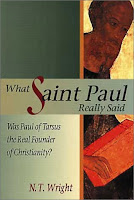 Good News for the PagansThis year as I focus my reading on the Apostle Paul I am seeking to understand better the writings of N.T. Wright. So I am doing a chapter-by-chapter summary of his book, What Saint Paul Really Said: Was Paul of Tarsus the Realy Founder of Christianity? (Wm. B. Eerdmans Publishing Company, 1997). Today we are looking at the first half of chapter 5.
Good News for the PagansThis year as I focus my reading on the Apostle Paul I am seeking to understand better the writings of N.T. Wright. So I am doing a chapter-by-chapter summary of his book, What Saint Paul Really Said: Was Paul of Tarsus the Realy Founder of Christianity? (Wm. B. Eerdmans Publishing Company, 1997). Today we are looking at the first half of chapter 5. As Wright has been stressing throughout this book, Paul was a Jew; as such we need to root his thought in a Jewish matrix rather than a substantially Hellenistic one. However, he does believe that we need to take Paul's non-Jewish context seriously. "Paul, after all, describes himself, almost by definition, as the apostle to the
Gentiles" (p. 78).
The word
paganism is being used in the broad sense and, "denotes, basically, those who are neither Jews nor Christians, and carries the connotation of their develped worldviews, in which religion and politics, superstition and magic, hope and fear, and sometimes ethics and morals, cluster together around a bewildering range of symbols and stories, developed over many centuries and involving many quite diverse cultures" (p. 78-9).
Derivation and ConfrontationSome scholars have suggested that Paul's thought derived from paganism. This isn't the line Wright takes. In relation to paganism (at least I think this is what he is saying), "Direction is more important than derivation; confrontation is as important, if not more important than conception" (p. 79). In other words, Paul didn't adopt a pagan worldview. He confronted paganism with the good news seeking to replace their worldview with a Jewish one that placed Jesus in the middle of it. According to Wright, if we are going to recover Paul's message to his non-Jewish hearers we will have to look at his letters, looking particularly at his work among the pagans.
Polemical Engagement"By 'polemical engagement' I mean that Paul becomes, as he says, all things to all people (1 Corinthians 9.22" (p. 80). Paul used
key concepts from opposing systems of thought but he never became a syncretist (he did 'sharply confront paganism). Since, though, all truth belongs to God "confrontation does not simply mean head-to-head total disagreement" (p. 81).
Paul acted like this because he had a firm belief that it was a part of God's ancient plan to bring gentiles into the blessing of Israel. "When Zion was restored, the nations would flock in to hear the word of Israel's God" (p. 82). Since, through the death and resurrection of Jesus, the New Age had dawned the Gentiles would partake in the blessing. This was always a part of God's saving plan; this is why he called Israel in the first place.
The Jewish message was a monotheistic one which meant that the pagan world could be addressed with a message from the one true God. "The message, paradoxically, had to remain essentially Jewish if it was to have its proper relevance to the pagans" (p. 83).
Critique from WithinPaul was like a prophet to Israel warning them that they were headed in the wrong direction and calling them back to true allegiance to YHWH. He was not denying that they were his special people but that they had failed in their vocation; the Messiah, as Israel's representative, had been faithful and God's people were to be defined in him. Israel was in danger of becoming like all the other nations; their 'extreme zeal' was leading them the wrong way.
Wright emphasizes that Paul remained zealous but it was a 'zeal according to knowledge". "He still saw the message of the true God as challenging the false gods. He still saw the great mass of Judaism as being disloyal to the true God, and needing to be brought into line. But the line in question was now the Christian, fulfilled-Israel, line" (p. 85).
Next time we will be looking at the second half of chapter 5 where Wright looks at the specifics of this message to the pagans.









